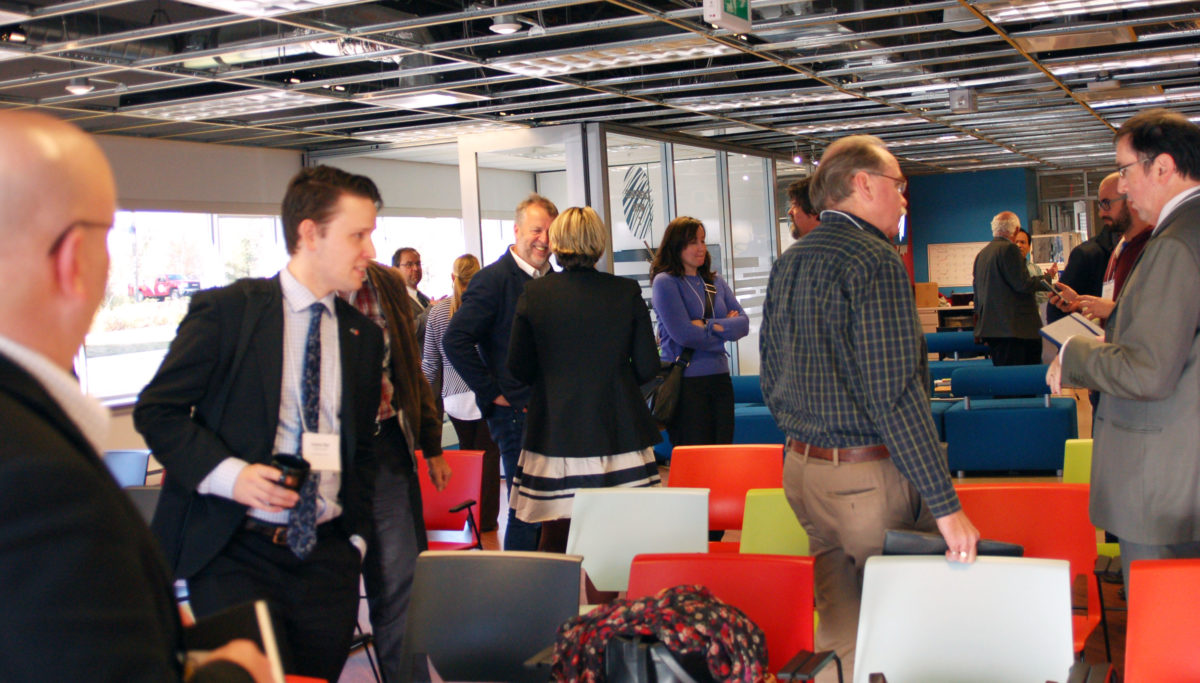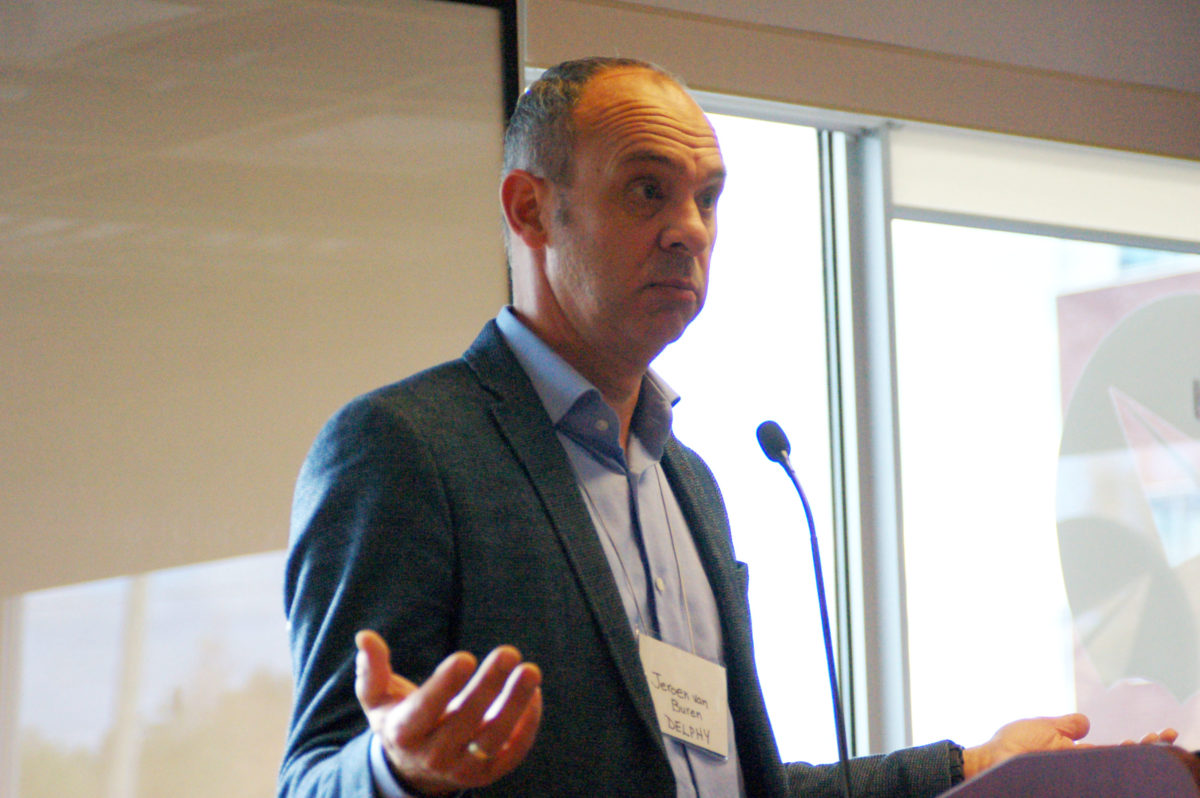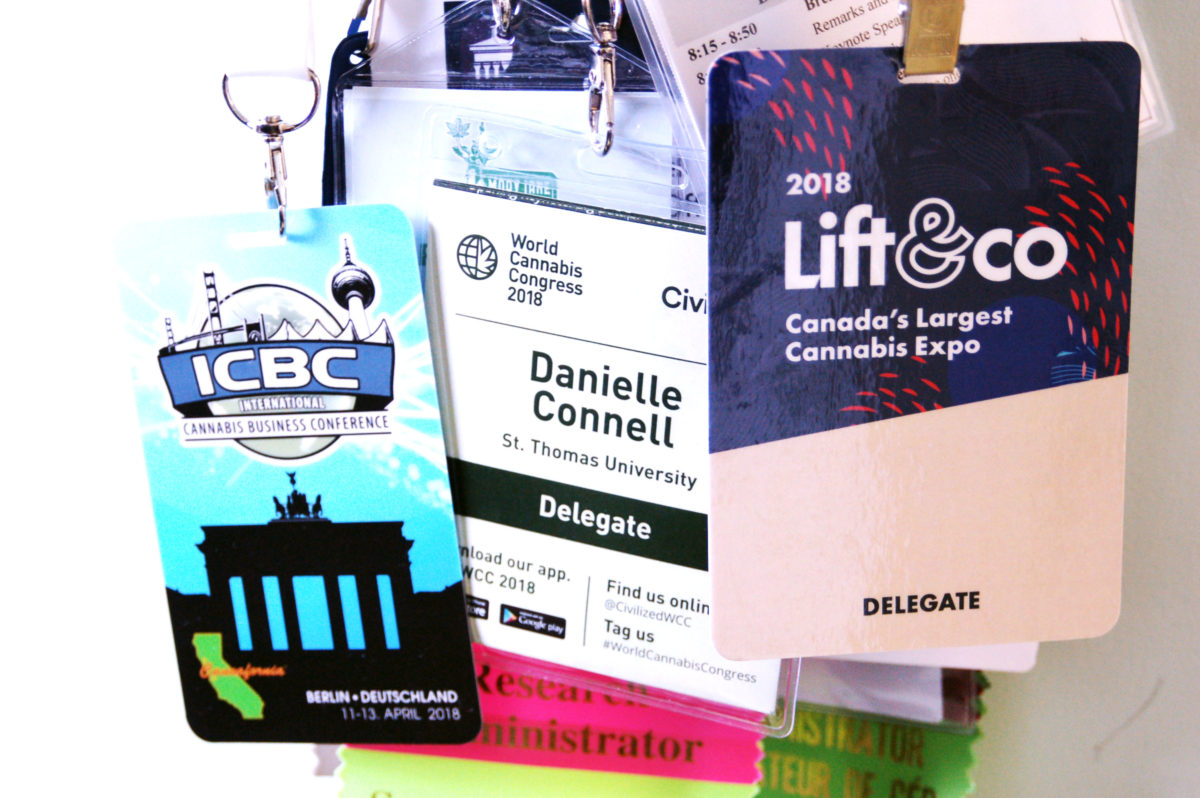The Freddy Beach Cannabis Mixer was held at Planet Hatch on Oct. 22. The green, blue, grey and orange chairs were filled with approximately 45 academics, researchers, university representatives and business owners from around the province. They connected with Delphy, a worldwide Dutch company known for their expertise in food and flowers … but no, not that kind. Well, not yet anyway.
Following a trip to Germany and the Netherlands in April, members of Springboard Atlantic, a not-for-profit organization based out of the Maritimes, decided to bring some of the companies they met there to New Brunswick to discuss potential partnerships. The mixer was one of these networking events.
Jeroen van Buren, an owner of Delphy, spoke about the company’s desire to build partnerships with licensed researchers, companies and universities in New Brunswick.
“We are very interested [in doing] research [here],” he said.
Danielle Connell, a research services officer at St. Thomas University and organizer of the mixer, said it’s rewarding to see people they met in Germany and the Netherlands coming to New Brunswick to visit.
“It feels like we’re on the right track. The relationship that we’re developing between New Brunswick and [the Netherlands] is one that could be so fruitful for both of us,” she said.


Trippin’
When Springboard Atlantic travelled to Germany and the Netherlands, they were the first interdisciplinary Canadian delegation to discuss cannabis, said Connell, the Springboard representative for STU.
They represent 19 universities and colleges in Atlantic Canada. The organization consists of Opportunities NB, Atlantic Canada Opportunities, the Government of New Brunswick, Ignite Fredericton, BioNB, l’Université de Moncton, the University of New Brunswick, New Brunswick Community College in Moncton and St. Thomas University.
Their goal is to help researchers connect with industries to enhance local economies and knowledge.
They were invited to meet with the Government of the Netherlands, universities and industry sites to understand how cannabis is being researched in Germany and the Netherlands, including growing techniques. They visited Wageningen University & Research and Groningen University, which Connell described as “ground zero for [Dutch] cannabis science.” Springboard representatives also attended the International Cannabis Business Conference in Berlin, as the largest group of Canadian representatives there – which they were recognized for.
“We went there as a blank slate and we basically just entered meetings going, ‘This is who we are, this is what’s going on in Canada,’ and half of them didn’t even know we were legalizing cannabis and they were astounded,” said Connell.
“We had to leave all of our assumptions at the door because none of them were right. Cannabis use is not legal in [the Netherlands.] It’s tolerated. It’s decriminalized to buy it, but every other part of the process is illegal.”
According to René Corsten, senior advisor for Delphy, rules regarding cannabis in the Netherlands are strange.
“It’s legal to sell cannabis in the shops in small amounts, but for the shop, it’s illegal to buy it and it’s illegal to grow … it’s a little bit strange,” he said at the mixer.


Students’ role in research
Connell is working to bring two students she met while on the trip to STU to conduct research on cannabis. She hopes they will be here by 2019, with one potentially starting on Jan. 1.
One PhD student from Groningen University is interested in conducting research with the criminology department. But instead of looking at cannabis through a criminal law lens, the focus will be on administrative law.
Another student from the University of Amsterdam is interested in studying the differences between legalization in each province and territory in Canada.
According to Connell, the Netherlands will be choosing 10 cities to test legalization. This student wants to compare the effects in both countries.
Funding will be provided by Mitacs, a not-for-profit organization that creates partnerships between post-secondary institutions and industries for research.
However, it’s not just open to these students. Any third or fourth year student attending a New Brunswick university or college, including international students are welcome to apply. Funding will be $15,000 per student to cover four months of research – typically a summer internship, but the duration of research isn’t limited to this. Students can stay in Canada or travel elsewhere. According to Valerie Bonnardel, business development specialist at Mitacs, 40 internships will be available, valued at a total of $300,000 per year. This funding will also cover travel and housing.
“Of course, this is not limited … this is the minimum that we want to provide … if it needs to be more, there will be more,” said Bonnardel.
Although it’s hard to “flip the switch” without a cannabis chair in place at STU, Connell hopes the university can lay the groundwork with student research before the position is filled.


‘It’s go time’
Connell believes there is a spotlight on STU and UNB because the universities were offered cannabis research chairs.
The Health Research Chair in Cannabis at STU will focus on the social impacts as well as public policy surrounding cannabis. Connell hopes the position is filled by Jan. 1, 2019 as the interviewing process has already begun, but she said it may take until July 1, 2019.
“There’s this sense of, ‘OK, we’ve got to put together a huge project because that’s what’s expected of us.’ We’ve been given this gift, this opportunity, we have to do something with it,” said Connell.
“Universities are where the scientific evidence is going to come from – for us to do this right, as a country. Every time you turn on the radio and they’re talking about cannabis, they say, ‘Well there isn’t any research, there isn’t any research’ … so, every time they say that, they’re looking at us going, ‘Ok, this is your job, conduct the research.'”
She believes any research STU does will lead to more funding and support for the university.
“I hope that our cannabis chair can, maybe I can use a term ‘rally the troops,’ and demonstrate the importance of the social sciences within applied research projects.”
“Being given this cannabis research chair and Mitacs internship allocation, [this] is an opportunity we will never see again, to establish St. Thomas as an equal with the other universities in our province. This could be a game-changer,” Connell said.
“It’s go time.”

